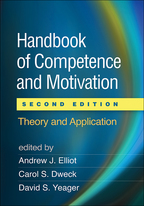Handbook of Competence and Motivation
Second Edition
Theory and Application
Edited by Andrew J. Elliot, Carol S. Dweck, and David S. Yeager
Paperbacke-bookprint + e-book
Paperback
orderMarch 1, 2018
ISBN 9781462536030
Price: $70.00 722 Pages
Size: 7" x 10"
Copyright Date: 2018
Andrew J. Elliot, PhD, is Professor of Psychology at the University of Rochester. He has been a visiting professor at Cambridge University and Oxford University, United Kingdom; King Abdulaziz University, Saudi Arabia; and the University of Munich, Germany, and a Visiting Fellow at Churchill College (Cambridge) and Jesus College (Oxford). Dr. Elliot’s research focuses on achievement motivation and approach-avoidance motivation. He is editor of Advances in Motivation Science and author of approximately 200 scholarly publications. The recipient of multiple awards for his teaching and research contributions to educational and social/personality psychology, he has given keynote or university addresses in more than 20 countries, and his lab regularly hosts professors, postdocs, and graduate students from around the globe.
Carol S. Dweck, PhD, is the Lewis and Virginia Eaton Professor of Psychology at Stanford University. Her research focuses on the critical role of mindsets in students’ achievement and has led to successful intervention to foster student learning. Dr. Dweck is a member of the American Academy of Arts and Sciences and the U.S. National Academy of Sciences, and is the recipient of nine different lifetime achievement awards for her research. She addressed the United Nations on the eve of its new global development agenda and has advised governments on educational and economic policies. Dr. Dweck's bestselling book Mindset: The New Psychology of Success brought her research to the wider public.
David S. Yeager, PhD, is Assistant Professor of Psychology at the University of Texas at Austin. Dr. Yeager’s research focuses on motivation and adolescent development and on the use of behavioral science to make improvements toward pressing social issues. Dr. Yeager is co-chair of the Mindset Scholars Network, an interdisciplinary network devoted to improving the science of learning mindsets and expanding educational opportunity. He holds appointments at the Carnegie Foundation for the Advancement of Teaching, the Population Research Center and the Charles A. Dana Center at the University of Texas at Austin, and the Center for Advanced Study in the Behavioral Sciences, and he is the recipient of more than 15 awards in social, developmental, and educational psychology.
Carol S. Dweck, PhD, is the Lewis and Virginia Eaton Professor of Psychology at Stanford University. Her research focuses on the critical role of mindsets in students’ achievement and has led to successful intervention to foster student learning. Dr. Dweck is a member of the American Academy of Arts and Sciences and the U.S. National Academy of Sciences, and is the recipient of nine different lifetime achievement awards for her research. She addressed the United Nations on the eve of its new global development agenda and has advised governments on educational and economic policies. Dr. Dweck's bestselling book Mindset: The New Psychology of Success brought her research to the wider public.
David S. Yeager, PhD, is Assistant Professor of Psychology at the University of Texas at Austin. Dr. Yeager’s research focuses on motivation and adolescent development and on the use of behavioral science to make improvements toward pressing social issues. Dr. Yeager is co-chair of the Mindset Scholars Network, an interdisciplinary network devoted to improving the science of learning mindsets and expanding educational opportunity. He holds appointments at the Carnegie Foundation for the Advancement of Teaching, the Population Research Center and the Charles A. Dana Center at the University of Texas at Austin, and the Center for Advanced Study in the Behavioral Sciences, and he is the recipient of more than 15 awards in social, developmental, and educational psychology.



